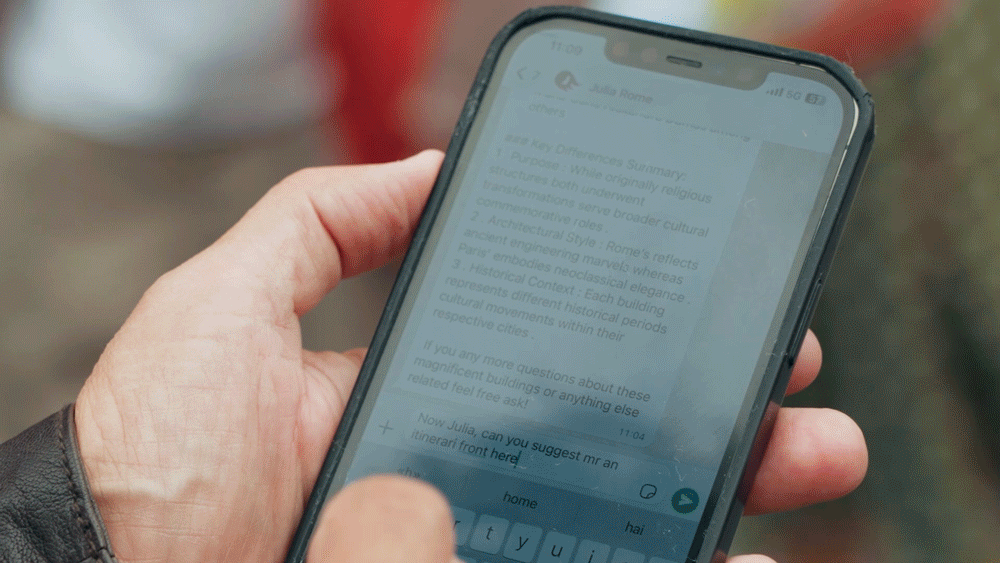Today we want to highlight a customer story featuring Semantic Kernel here: Discovering Rome’s hidden treasures with an AI virtual assistant – Source EMEA
On a sunny Monday morning in late September, a river of travelers flowed slowly through the Piazza della Rotonda. The focal point of the piazza is the Pantheon, the nearly 2,000- year-old temple to all the Roman gods, and is one of the city’s most popular landmarks.
Fronted by imposing rows of Corinthian columns, it merits the attention it draws. Nearly every visitor slowed down for a photo or selfie, vainly attempting to capture its perfect proportion in pixels.
Antonio Preiti, himself a citizen of Rome, was also using his smartphone in front of the Pantheon. He opened a conversation with a simple question: Is there a quiet, historic place nearby where we can have lunch?
A virtual tour guide named Julia, commissioned by the city of Rome and powered by Microsoft Azure OpenAI Service using GPT-4o, responded that the Piazza Mattei, also known as the Turtle Square, was just 15 minutes away on foot. There we would find another place typical of Rome, with layers that traverse thousands of years. Preiti and two companions set off, following Julia’s directions.
The AI virtual assistant is the brainchild of Preiti and the government of Rome, which is preparing to greet as many as 35 million extra visitors in 2025 for the celebration of the Catholic Jubilee. The name Julia was chosen, Preiti says, “because it is short, fairly common across many languages and it has a deep connection to Rome and its history. Julia is a typically Roman name: Julius Caesar’s daughter was named Giulia, Augustus’s daughter was named Giulia, and one of the oldest families in Rome had the Latin name ‘gens Julia’.”
Working with Microsoft and NTT DATA, a global provider of business and technology services, and Intellera, a consulting company in the Accenture Group, the city hopes that Julia will create a quiet revolution in how visitors experience the city. By equipping travelers with a trusted guide, the city wants to enrich their experiences beyond the typical tourist circuit, all while easing congestion around the most popular sites.

Helping Travelers discover more of Rome
Within a few minutes of walking away from the Pantheon with Preiti, the crowd receded, the streets narrowed, and the conversation flowed.
“The solution in my opinion, is a solution by information,” says Preiti. “When I heard about generative AI, I thought this is a way to help create a balance, to let people know about not just the iconic places, but the other places Rome has to offer.”
Preiti is an economist who has focused much of his research and thought on tourism and travel. He was the director of tourism for the city of Florence for five years, and now the mayor of Rome has appointed him the CEO of a commission designated to address tourism in Italy’s capital.
He has written often about overtourism and the “click bait” approach of the Internet. That type of strategy, he says, reinforces crowd pressure on well-known attractions such as the Pantheon, the Colosseum and the Vatican, the latter of which will be at the heart of the Jubilee.
That data, ready to be shared by the virtual assistant via a web app or WhatsApp, is a vast library of certified information about the city’s history, monuments, museums, hotels, restaurants, entertainment possibilities and more.
Instead of always getting the most popular answer at the top of the search list, tourists who converse with Julia will get answers based on their questions, not algorithms based on popularity. In this way, they will be exposed to things they otherwise might not, Preiti says.
He cites the “Nudge Theory” of behavior. In this approach, small actions, such as putting fruit instead of desserts at eye level in a cafeteria, have the potential to create large changes in the choices people make. The city hopes that will mean more travelers at less-visited sites and fewer travelers at well-worn favorites.

Rome’s own dataset
To that end, NTT DATA and the city of Rome have been working together to build a dataset from both official and vetted sources, he said. Because many tourist businesses name themselves with an eye on “click bait,” not everything labeled with the word Colosseum pertains directly to the monument, for example.

Camilla Giacometti is an innovation analyst whose job is to work with Julia, the virtual assistant, from a conversational point of view. NTT DATA has a specialized department for digital linguistics.
“My job is to make the digital assistant more engaging, more human,” she says. “So my role is basically to work on the interaction between the travelers and the assistant.”
The virtual assistant application relies on Semantic Kernel, an open-source development kit created by Microsoft, Giacometti explains. It enables developers to build AI agents focused on different topics. “For example, there is the agent specialized on finding information about accommodation, or there is the agent specializing in providing information about transportation or culture.”
She says NTT DATA leverages a full suite of Microsoft products to develop and maintain Julia. The company uses Microsoft Fabric, an end-to-end analytics and data platform designed to unify various data-related tasks and tools into a single, cohesive environment. “Then we have Azure AI Search for semantic search, so we can provide the relevant information with the service,” she adds. This is part of the process that ensures that travelers get relevant and precise answers based on their questions.
In terms of privacy, NTT DATA will gather the content of conversations with Julia for monitoring and improvement purposes, but the data goes through a cleaning process that removes personal data if it is detected. It is also protected using Azure AI Content Safety, an AI service that detects harmful user-generated and AI-generated content in applications and services.
Giacometti, who is based in Naples, says she’s proud to be a part of Julia’s trajectory: The virtual assistant is expected to be officially made available to the public in December; the 2025 Jubilee starts January 1.


0 comments